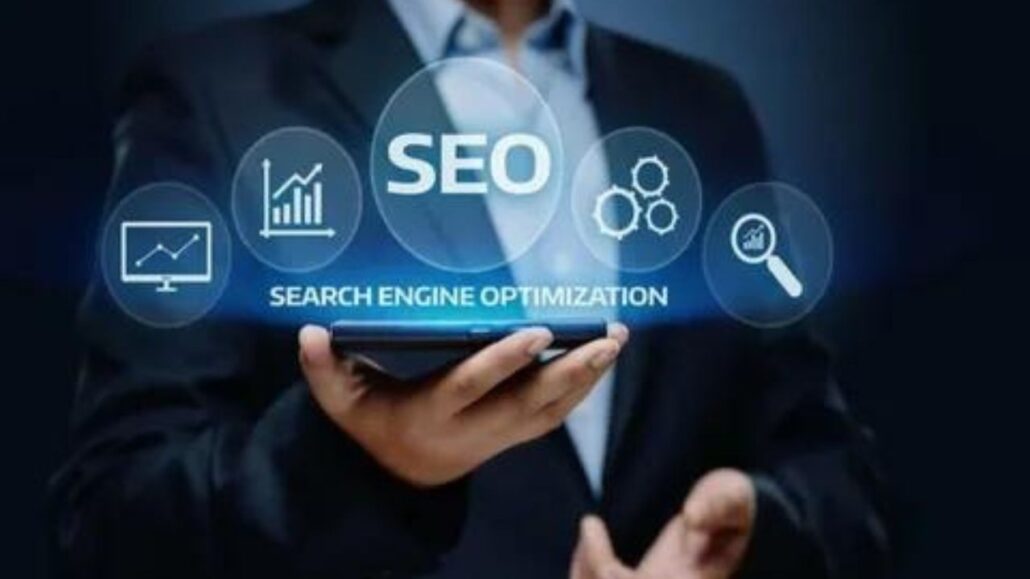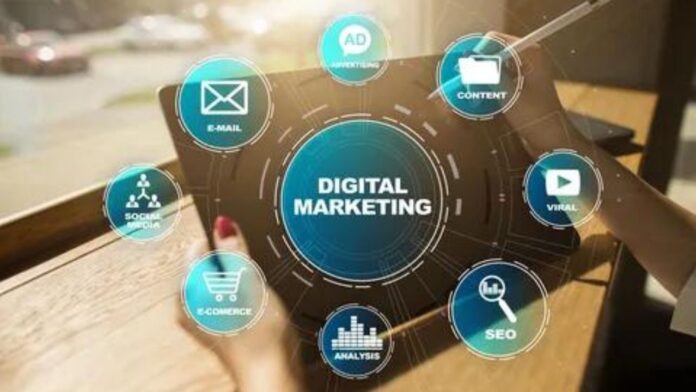Digital marketing in real estate encompasses website optimization, content marketing with engaging property descriptions and visual media, SEO strategies like local SEO, social media engagement, email campaigns, paid advertising, analytics for tracking ROI, mobile-friendly approaches, virtual reality tools, CRM integration, lead generation, and reputation management.
Website Design and Optimization

Website design and optimization in digital marketing for real estate involve creating visually appealing and user-friendly websites. This includes implementing responsive design for seamless viewing across devices, enhancing the user experience with intuitive navigation and fast loading times, and incorporating clear calls-to-action.
Prioritizing these elements ensures that potential buyers and sellers can easily access property listings and engage with the website, leading to increased leads and conversions.
Importance of Responsive Design
A visually appealing and user-friendly website is paramount in the competitive real estate market. Responsive design ensures that your website adapts seamlessly to different devices, providing an optimal viewing experience for users across desktops, smartphones, and tablets.
Responsive design is crucial in digital marketing for real estate due to its ability to adapt seamlessly to various devices. Ensuring a responsive website enhances the user experience by providing optimal viewing regardless of screen size, ultimately leading to higher engagement and conversions from potential buyers and sellers.
User Experience Enhancement
Apart from aesthetics, prioritizing user experience is crucial. This includes easy navigation, fast loading times, and clear calls-to-action (CTAs) to encourage visitors to explore listings or contact agents.
Improving user experience (UX) is paramount in digital marketing for real estate. It involves enhancing website navigation, optimizing loading times, and ensuring intuitive design elements. Real estate professionals can create a seamless online environment that engages visitors and encourages them to explore property listings further by prioritizing UX.
Content Marketing
Content marketing in real estate involves creating compelling property descriptions and utilizing visual content like images and videos to showcase properties and attract potential buyers.
Creating Engaging Property Descriptions
Compelling property descriptions are essential for capturing the interest of potential buyers. Descriptions should be detailed yet concise, highlighting key features and amenities while vividly portraying the property’s lifestyle benefits.
Crafting compelling property descriptions is a crucial aspect of digital marketing in real estate. It involves capturing the essence of a property through vivid storytelling, highlighting its unique features and amenities to evoke interest and excitement among potential buyers. By effectively communicating the lifestyle benefits of the property, these engaging descriptions entice viewers to explore further and make a purchase decision.
Utilizing Visual Content: Images and Videos
Visual content, such as high-quality images and videos, is pivotal in showcasing properties online. Virtual tours and drone footage provide immersive experiences, giving prospective buyers a comprehensive view of the property without physically visiting it.
Search Engine Optimization (SEO)
SEO in real estate digital marketing involves optimizing websites to rank higher in search engine results and improving visibility to potential buyers and sellers. This includes keyword research, local SEO strategies, and content optimization to attract targeted traffic and generate quality leads.
Keyword Research for Real Estate
Keyword research is fundamental for optimizing real estate websites for search engines. Understanding the language and phrases potential clients use when searching for properties online helps craft relevant content and meta tags.
Local SEO Strategies
Optimizing for local SEO is indispensable for real estate professionals targeting local markets. This involves creating localized content, obtaining backlinks from local directories, and maintaining consistency in NAP (Name, Address, Phone Number) citations across online platforms.
Local SEO strategies optimize online presence to attract customers from specific geographic areas. This involves optimizing Google My Business listings, local keyword targeting, obtaining citations from local directories, encouraging online reviews from local customers, and ensuring consistent NAP (Name, Address, Phone Number) information across all platforms.
These tactics aim to improve visibility in local search results and drive foot traffic to physical locations.
Social Media Marketing

Leverage social platforms like Facebook, Instagram, and LinkedIn for targeted ads, engaging posts, and real-time interactions to amplify brand reach and foster connections.
Leveraging Platforms for Brand Awareness
Social media platforms like Facebook, Instagram, and LinkedIn provide valuable opportunities to showcase listings, share industry insights, and engage with a broader audience. Consistent branding and storytelling can help in establishing a strong online presence.
Utilizing various social media platforms enhances brand visibility and recognition, increasing awareness among potential clients and customers. This involves strategic content sharing, engaging with the audience through comments and messages, and establishing a consistent brand presence across platforms.
Engaging with Potential Buyers and Sellers
Engagement is key in social media marketing. Responding promptly to inquiries, sharing informative content, and fostering meaningful conversations can build trust and credibility, ultimately driving leads and conversions.
Interacting effectively with prospective buyers and sellers is a crucial aspect of digital marketing in real estate.
This involves:
- Actively engaging with them on various platforms.
- Addressing their queries and concerns.
- Nurturing relationships.
- Guiding them through the buying or selling process to ensure a positive experience and foster trust.
Email Marketing Campaigns
Email remains one of the most effective communication channels in digital marketing. Crafting personalized, targeted email campaigns enables you to nurture leads, provide valuable insights, and stay top-of-mind with potential clients. Whether showcasing new listings, sharing market trends, or offering exclusive promotions, email marketing campaigns can drive engagement and conversions.
Analytical Insights and Optimization
Data-driven decision-making is crucial in maximizing the efficacy of your digital marketing efforts. Analytical tools like Google Analytics provide valuable insights into website traffic, user behavior, and conversion metrics. You can refine your strategies and drive sustainable growth by continuously monitoring and optimizing your digital campaigns based on performance data.
Integrated Marketing Automation
Streamlining your marketing processes through automation enhances efficiency and scalability. Implementing marketing automation tools allows you to automate repetitive tasks, such as lead nurturing, email drip campaigns, and social media scheduling.
By orchestrating seamless, personalized experiences across multiple channels, you can efficiently manage your marketing efforts and drive meaningful engagement.
Paid Advertising
Paid advertising in digital marketing for real estate involves leveraging platforms like Google Ads and Facebook Ads to target specific audiences, increase brand visibility, and drive qualified leads to property listings.
Google Ads for Real Estate
Google Ads, particularly through PPC (Pay-Per-Click) campaigns, can boost visibility in search engine results pages (SERPs) for relevant keywords. Targeting specific locations and demographics ensures that ad spend is directed towards qualified leads.
Google Ads for real estate is a powerful marketing tool allowing agents and agencies to promote their listings and services effectively. By targeting specific keywords and demographics, advertisers can reach potential buyers and sellers actively searching for properties, maximizing visibility and driving qualified leads to their websites.
Facebook Ads Targeting
Facebook’s robust targeting options make it an ideal platform for real estate advertising. From demographics and interests to behaviors and life events, advertisers can precisely narrow their audience to reach potential buyers or sellers.
Facebook ad targeting involves utilizing Facebook’s sophisticated targeting options to reach specific audiences based on demographics, interests, behaviors, and life events. This precision allows advertisers to tailor their ads effectively, ensuring they reach the most relevant users and maximize campaign effectiveness.
Analytics and Reporting
Utilize tools like Google Analytics to gather insights on website traffic, user behavior, and campaign performance, enabling data-driven decisions and continuous optimization for enhanced marketing effectiveness.
Tracking Website Traffic and Conversions
Analyzing website traffic and user behaviour provides valuable insights into the effectiveness of marketing campaigns. Tracking conversions, whether form submissions or phone calls, helps measure the ROI of digital marketing efforts.
Tracking website traffic and conversions is vital to digital marketing analytics in the real estate industry. It involves monitoring the volume and behaviour of website visitors and analyzing the effectiveness of marketing campaigns in driving desired actions such as inquiries, form submissions, and property purchases.
By measuring these metrics, real estate professionals can gain valuable insights into the performance of their online strategies and make data-driven decisions to optimize their marketing efforts.
Measuring ROI of Marketing Efforts
What Is Included In Digital Marketing Real Estate Attributing conversions to specific marketing channels and campaigns allows real estate professionals to allocate resources more efficiently. ROI calculations help determine which strategies deliver the best results and where adjustments are needed.
Mobile Marketing

Content marketing in real estate involves creating compelling property descriptions and utilizing visual content like images and videos to showcase properties and attract potential buyers.
Mobile marketing in real estate involves tailoring marketing efforts specifically for mobile devices. This includes optimizing websites and emails for mobile viewing, leveraging SMS marketing for direct client communication, and utilizing mobile apps for property search and virtual tours. By focusing on mobile-friendly strategies, real estate professionals can effectively reach and engage with on-the-go audiences, driving leads and conversions.
Importance of Mobile-Friendly Content
What Is Included In Digital Marketing Real Estate With most internet users accessing content via mobile devices, optimizing marketing efforts for mobile is imperative. Mobile-friendly websites, responsive emails, and SMS marketing ensure a seamless experience for on-the-go users.
Recognizing the significance of mobile-friendly content in digital marketing for real estate is crucial. With most internet users accessing information via mobile devices, optimizing content to be easily accessible and visually appealing on smartphones and tablets is essential for engaging potential buyers and sellers effectively.
SMS Marketing for Real Estate
When done thoughtfully, SMS marketing can be a powerful tool for real estate professionals. From sending property alerts to appointment reminders, leveraging text messages for communication enhances engagement and fosters direct interaction with clients.
Virtual Reality and Augmented Reality
Virtual Reality (VR) and Augmented Reality (AR) enhance real estate marketing by offering immersive property tours and digitally staged listings.
Enhancing Property Viewing Experience
Virtual reality (VR) and augmented reality (AR) technologies revolutionize how properties are showcased online. Immersive VR tours and AR staging allow potential buyers to visualize themselves in the space, driving deeper engagement and interest.
Improving the property viewing experience involves utilizing innovative technologies such as virtual reality (VR) and augmented reality (AR) to offer immersive virtual tours and digitally staged representations. These tools allow potential buyers to visualize themselves in the space, fostering deeper engagement and facilitating informed decision-making.
Virtual Staging for Listings
Virtual staging eliminates the need for physical staging by digitally furnishing empty properties. This cost-effective solution enhances listing photos and helps buyers envision a space’s potential, leading to faster sales.
Virtual staging for listings is an innovative technique in real estate marketing that digitally furnishes vacant properties to showcase their full potential. Adding virtual furniture and decor enhances listing photos, allowing potential buyers to envision themselves in the space and driving greater interest and engagement.
CRM Integration
What Is Included In Digital Marketing Real Estate CRM integration in real estate streamlines communication and organizes client data, ensuring personalized experiences and efficient lead management.
Managing Customer Relationships Efficiently
Customer relationship management (CRM) software streamlines communication and organizes client data, enabling real estate professionals to provide personalized experiences. Integration with marketing platforms ensures seamless lead nurturing and follow-up.
Efficiently managing customer relationships in digital marketing for real estate entails utilizing customer relationship management (CRM) software to streamline communication channels, organize client data, and provide personalized experiences. Integration with marketing platforms ensures seamless lead nurturing and follow-up, fostering stronger and more productive client relationships.
Streamlining Communication Channels
Centralizing communication channels within a CRM system simplifies interactions with clients, whether it’s via email, phone calls, or social media. Automated workflows and personalized messaging enhance efficiency and foster stronger client relationships.
Lead Generation
What Is Included In Digital Marketing Real Estate Employ strategic tactics such as content marketing, email campaigns, and social media engagement to attract and convert prospects into qualified leads.
Strategies for Generating Quality Leads
Effective lead generation involves a combination of inbound and outbound strategies tailored to the real estate industry. Strategies for Generating Quality Leads in digital marketing for real estate entail a multifaceted approach to attracting and nurturing potential clients.
This involves leveraging channels such as website optimization, content marketing, social media engagement, email campaigns, and targeted advertising to capture and cultivate leads genuinely interested in buying or selling properties.
Effective lead-generation strategies focus on delivering valuable content, personalized communication, and seamless experiences to prospects, ultimately driving conversions and fostering long-term relationships.
Conclusion
What Is Included In Digital Marketing Real Estate Effective marketing is essential for success in the real estate industry in today’s digital landscape. By leveraging tailored website development, strategic SEO, compelling content creation, social media marketing, email campaigns, analytical insights, and integrated automation, you can unlock the full potential of digital marketing in real estate.
FAQ
What is Real Estate Digital Marketing?
Real estate organizations can use digital marketing to reach their target audience through social media platforms, search engines, and other online channels, increasing brand awareness, generating leads, and driving sales.
What Does Digital Marketing Include?
Digital marketing can be broadly broken into eight main categories: affiliate marketing, content marketing, email marketing, marketing analytics, mobile marketing, pay-per-click, search engine optimization and social media marketing.
What is Included in a Digital Marketing Plan?
What Is Included In Digital Marketing Real Estate A digital marketing plan is a document that outlines a company’s goals for promoting products and services online and how they expect to connect with them. These documents focus on the marketing team’s methods for communicating information about the company’s offerings to its target market.
Is Real Estate a Good Niche for Digital Marketing?
Real Estate: Real estate is a highly competitive industry, and digital marketing can help agents and brokers stand out in a crowded market. An agency specialising in real estate can offer services such as SEO, PPC, social media marketing, and content marketing.
Do Google ads work for Real Estate Agents?
Google Ads is the most powerful tool for real estate professionals who want to connect with the increasing number of home buyers and sellers turning to the Internet for their property needs. Yesterday’s real estate agents spent most of their time using antiquated marketing methods like cold-calling or postcard mailing.



